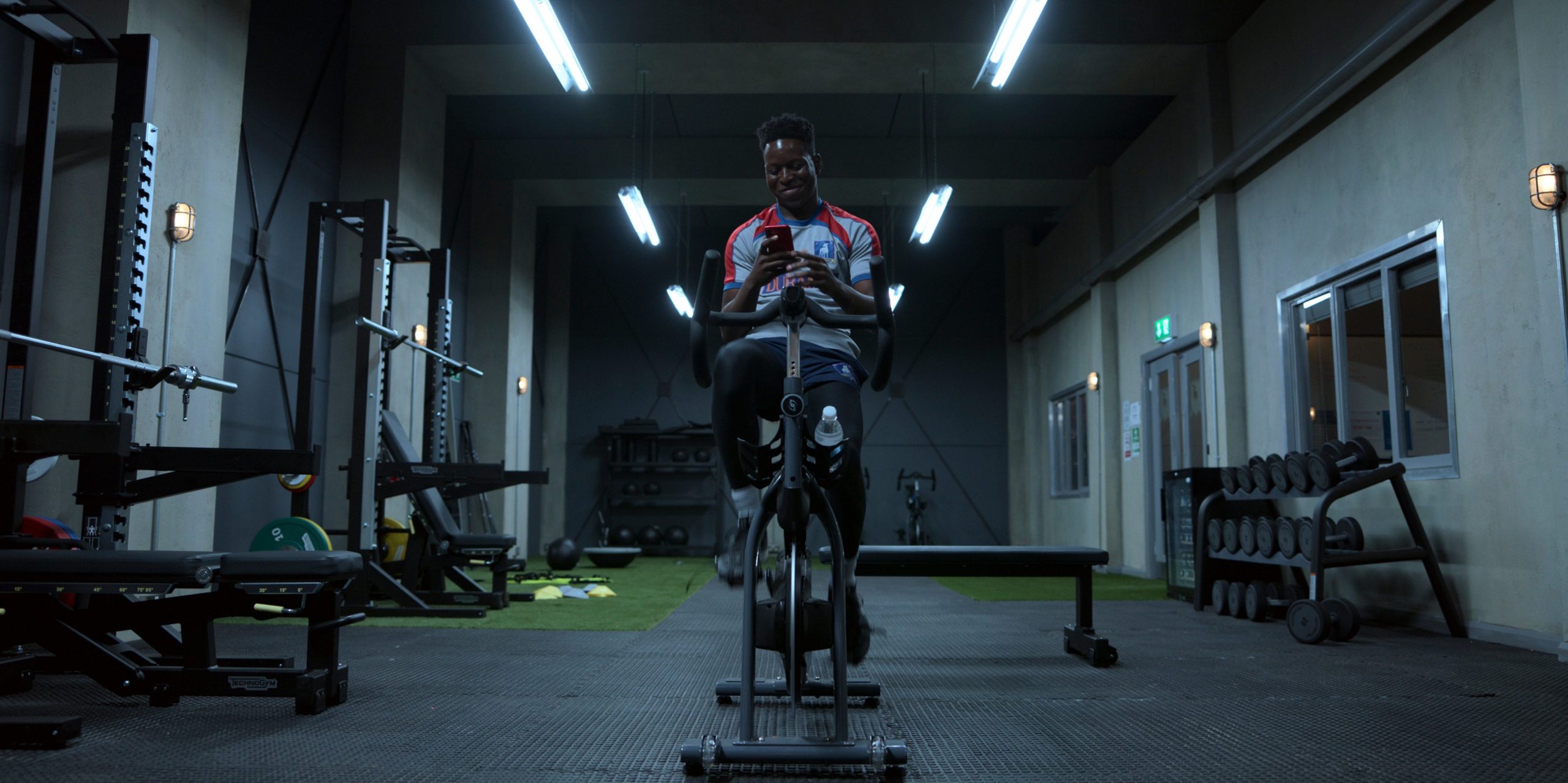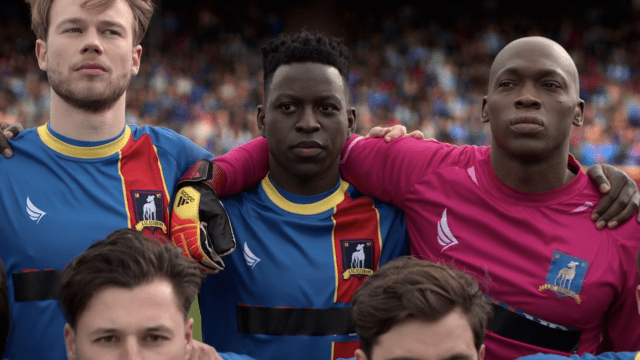Recent research suggests that people who aren’t interested in entertainment that is explicitly “environmental” will avoid it, whether it’s because they disagree with its perspective or because they’re just seeking entertainment. Which is why we need a lot more shows like Ted Lasso.
The Apple TV+ show follows the titular character, an American football coach hired to helm a struggling football (aka soccer) team in the UK, and his team and the surrounding cast of characters. Especially during the pandemic, the show has been a welcome light-hearted distraction for a wide range of viewers. Which made its sudden focus on environmental injustice this season — and its flawless execution — such a surprise.
In the third episode of season two, Sam Obisanya, a young Nigerian defender who has slowly become a team leader, is excited to land a deal starring in an advertising campaign with Dubai Air (a fictional airline), one of his club’s sponsors. Obisanya sends his father a message, expecting congratulations, but is informed that Dubai Air’s parent company, Cerithium Oil (a clear stand-in for Shell), is responsible for “destroying Nigeria’s environment and bribing government officials.” Sam asks to not be included in the ad, which the club’s owner agrees to. He goes a step further, staging a public protest on the pitch that the entire team backs him on.
Research has found that even though we know that fictional characters are fictional, on a neurological and emotional level we seem to interact with them as if they’re real. As such, the media that we consume inevitably has a powerful effect on our sense of ourselves and the world around us. Other shows should take note of Ted Lasso’s masterclass in how creators of non-environmental media can and should incorporate environmental issues.
First, the show offers a model of moving from ignorance to action. In this episode, Obisanya is initially unaware of Dubai Air’s connection to the devastation of Nigeria. After he is alerted to this fact, he does some research to educate himself. Then he decides to take a stand, by informing the club that he won’t be part of the ad campaign after all. In the locker room before the club’s next game, Obisanya goes a step further, placing black tape over the airline’s logo on his jersey.
To state the obvious: Action is critical. We tend to fetishise awareness, but it means nothing unless it leads to changes in attitude, behaviour, and engagement. In this episode, viewers witness an individual moving from ignorance to self-education to awareness to action. Most of us don’t have the platform of professional athletes, but by portraying an individual previously unconcerned with environmental issues who is willing to educate himself and take action, Ted Lasso normalizes this process and presents viewers with a model to follow in their own lives.
Second, the show depicts environmental activism as collective and joyful. One by one, Obisanya’s teammates stand with him in blacking out the airline’s name on their own jerseys. Obisanya’s action starts out as a solitary stand, but quickly receives social approval, support, and solidarity from his peers.
Additionally, it is fun — despite losing the game, the team celebrates together afterward. We tend to lionize the lone dissenter who perseveres in the face of social disapproval and punishment, demonstrating their heroic resolve, but that’s a lot to ask of people! Most of us want to do the right thing, but we also want support and approval from our peers, we want community, and we want to have a good time.
This is not only possible through activism, it’s what most successful movements and effective environmental groups have done. The Sunrise Movement, for example, centres storytelling and collective singing, which encourages people to interact and find community and joy in confronting what seems like an intractable problem. Just like the team does in Ted Lasso.
Third, the action that the team takes is likely to be effective, largely because it is collective and public. A single athlete taking a solitary action would make headlines but would have less impact. While Obisanya left the campaign, if he had stopped there it wouldn’t be an ideal model for environmental action — it would make him feel better, but no one would know what he did, and someone else would take his place in the campaign.

Publicly raising awareness to stigmatised the fossil fuel industry is considered a necessary and effective tactic by both activists and strategists. It’s not just a band-aid, or something that relieves a sense of guilt, but part of a broader strategy to keep fossil fuels in the ground. As deeply concerned as a growing number of people are about climate change, they often think they should engage in insignificant or even counterproductive actions in response to it, from using less plastic to buying carbon offsets.
Fourth, the action is successful! In the eighth episode of the season, we learn that Cerithium Oil has been ordered to stop operating in Nigeria, and Obisanya is described by his loving father as “the butterfly whose wings made this happen.” Successful campaigns are shockingly rare in TV and film portrayals of activism. While activism and political engagement shouldn’t be based solely on results, demonstrating that even limited victories can happen is more likely to encourage viewers to step up.
There is much more that Ted Lasso could do with this storyline, of course. Calling Obisanya “the butterfly” who led to Cerithium’s downfall doesn’t acknowledge the decades of real-world activism against Shell in Nigeria, sparked by the murder of Ken Saro-Wiwa and other Ogoni activists in 1995 after the company conspired with the Nigerian government. Ideally, shows can highlight the work of grassroots activists, and celebrities who take public action do so after consulting with them.
Ted Lasso could also return to this storyline, showing how environmental concerns and actions become a part of its characters’ lives. Perhaps the team becomes the favourite of football-loving environmentalists and activists worldwide, and finds an exciting sponsor in a renewable energy company, leading other clubs to follow its lead and reject fossil fuel sponsorship. (As it is, the team ends up getting sponsored by a dating app that also plays a pivotal role in the show.) Such developments might lead to a virtuous circle that sees more pro-environmental actions from the players, too.
This would be valuable because climate change, the nature crisis, and other systemic issues aren’t going to be solved by people doing a single thing. Fossil fuel companies aren’t going to disappear overnight, and, regardless of what we do now, climate change is only going to become a bigger factor in our lives in the coming decades. Fleeting depictions ignore the fact that these issues can’t be solved with a single bold act.
Whether or not this happens, a lighthearted sports show has become an instructive model of how cultural workers can incorporate environmental messages into non-environmental TV shows, and how they might do more. We can and should educate people through nonfiction articles and books, but it’s almost certainly more effective to show them through narratives on hit TV shows with millions of viewers. Given the urgency of the climate crisis and the power of media, Ted Lasso modelling environmental activism at its best is a very welcome development. And one that we need a lot more of — in every medium.
Matthew Schneider-Mayerson is a scholar of environmental literature, media, culture, and politics. He is currently an Associate Professor of Environmental Studies at Yale-NUS College.
